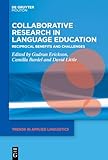Collaborative Research in Language Education : Reciprocal Benefits and Challenges / ed. by Gudrun Erickson, Camilla Bardel, David Little.
Material type: TextSeries: Trends in Applied Linguistics [TAL] ; 20Publisher: Berlin ; Boston : De Gruyter Mouton, [2023]Copyright date: ©2023Description: 1 online resource (VIII, 217 p.)Content type:
TextSeries: Trends in Applied Linguistics [TAL] ; 20Publisher: Berlin ; Boston : De Gruyter Mouton, [2023]Copyright date: ©2023Description: 1 online resource (VIII, 217 p.)Content type: - 9783110787535
- 9783110787863
- 9783110787719
- 418.0071 23
- P53 .C65 2023
- online - DeGruyter
- Issued also in print.
| Item type | Current library | Call number | URL | Status | Notes | Barcode | |
|---|---|---|---|---|---|---|---|
 eBook
eBook
|
Biblioteca "Angelicum" Pont. Univ. S.Tommaso d'Aquino Nuvola online | online - DeGruyter (Browse shelf(Opens below)) | Online access | Not for loan (Accesso limitato) | Accesso per gli utenti autorizzati / Access for authorized users | (dgr)9783110787719 |
Frontmatter -- Preface -- Contents -- Introduction -- Part 1: Addressing challenges in the classroom -- 1 Combining theory and practice: Findings from a collaborative project on oral task design -- 2 Improving second language education through Intensive German Weeks: An action research collaboration between teachers and researchers -- 3 An affordance-focused approach for working with authentic materials: A practice–research initiative -- Part 2: Learners as collaborative agents -- 4 Reciprocity and challenge in researcher–student collaborative labour in a multilingual secondary school -- 5 The organic processes of learning in an exploratory collaborative action research (CAR) project -- 6 Managing linguistic diversity in an Irish primary school: Reciprocal collaboration in practice and research -- Part 3: Collaborative research in professional development -- 7 Collaboration, reciprocity, and challenges: Professional development-in-practice -- 8 Teachers and researchers collaborating to develop effective language education: The project Observing Interlanguage -- 9 Learning to become an English teacher: Collaboration, context and the self -- Part 4: Collaborative research and national policy -- 10 From research to a national curriculum: The case of a lexical syllabus -- 11 Tensions in collaborative research with teachers in the context of language education policy change in Finland -- 12 National graduate schools in language education: Dimensions of collaboration and reciprocity -- Afterword -- 13 An ethical perspective on collaborative research -- Contributors -- Index
restricted access online access with authorization star
http://purl.org/coar/access_right/c_16ec
Language education at all levels benefits from research in a multitude of ways. Conversely, educational practices and experiences offer fertile ground for research into language learning, teaching and assessment. This book views research in language education as a reciprocal venture that should benefit all participants equally. Practice is shaped by theory, which in turn is illuminated and refined by practice. The book brings together studies from different fields of language education in nine countries on four continents: Cameroon, Canada, Finland, India, Ireland, Israel, Italy, Japan and Sweden. The authors report on research that depends on the active involvement of teachers, teacher educators and learners of different ages and various backgrounds. The book focuses on projects designed to address challenges in the classroom and on the role of learners as collaborative agents in the research process as well as collaborative research in professional development and the role of collaborative research in the development of national policy.
Issued also in print.
Mode of access: Internet via World Wide Web.
In English.
Description based on online resource; title from PDF title page (publisher's Web site, viewed 25. Jun 2024)


